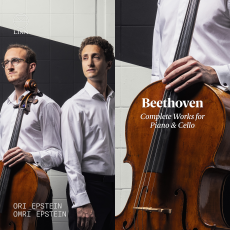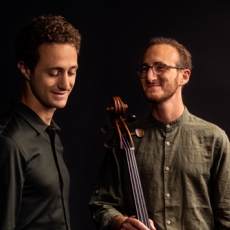Ori & Omri Epstein - Beethoven: Complete Works for Piano & Cello - MusicWeb International
Colleagues have pointed out that Beethoven’s music for piano and cello fits neatly onto two CDs with five sonatas and three sets of variations. The number of distinguished recordings has long since reached saturation point. Versions that I should mention are the very favourably reviewed Xavier Phillips and François-Frédéric Guy on Evidence Classics of which I have only heard short extracts, the evergreen Du Pré/Barenboim (Warner) for so many reasons only slightly qualified by being, of necessity, live and Pierre Fournier with both Friedricd Gulda and Wilhelm Kempff (DG). There are also two separate CDs by Daniel Müller-Schott and Angela Hewitt (Hyperion) one reviewed here. Finally, I should mention that Miklós Perényi and András Schiff are recommendable as are Brendel and son. Any newcomer therefore faces a huge amount of competition and needs, perhaps, an original approach. Linn presents these two brothers, members of the Busch Trio, whose discs have been reviewed in MWI. They certainly make a great effort and are fresh in their execution.
The two Op. 5 Sonatas come from Beethoven’s early years but are attractive works. I particularly admire the slow introduction to Cello Sonata no.1 before it bursts out into that exuberant Allegro - a movement that always reminds me, irreverently, of the Blackadder theme. The brothers are very enthusiastic in the Rondo and capture the stormy nature of the young composer. They are equally successful in the companion work, Cello Sonata no.2 in G minor, op. 5 no.2 and the sound, as one would expect from Linn, renders the instruments perfectly. The somewhat resonant acoustic and close microphone placement are suitable for these two instruments. One other aspect worth highlighting is that this duo are chamber musicians, rather than soloists and this works particularly well in these early works. The first movement Adagio, again starts slowly before the Allegro and develops to an even greater degree than its predecessor. The playing is particularly impressive and shows that these works should not be dismissed as juvenilia.
Cello Sonata no.3 in A major, op.69 was written over a decade after the first two works and it is clear from the start that we are hearing mature Beethoven. His deafness had descended like a dark cloud and resulted in his “Heiligenstadt Testament”, written in 1802, where he refers to contemplating suicide. Everything seems right to me in this performance and again it is like having the players in the room, which I’m fine with; others may prefer a less “in your face” recording. These brothers obviously know each other very well and it shows. Just sample the first few minutes of the Scherzo and I’ll be surprised if you’re not captivated. It raises a smile and the Epsteins certainly don’t disappoint in terms of wit and vigour. There is a foretaste of the final movement of Schubert’s Trout Quintet; no doubt the younger composer was aware of these works. The next movement starts quietly before developing into a Scherzo. It’s one of the reasons why this sonata is my favourite. They are certainly not po-faced in their approach and treat the music with a rugged quality, at times, which seems to suit the score’s sometimes-turbulent nature. I will refrain from comparisons but this is certainly well worth hearing and will be returning to be played in the future.
The last two Sonatas Op.102 are at beginning of Beethoven’s “late period” and are much more concise than their predecessors. I would refer you to Philip R Buttall in his review of DuoLeonore’s fine set of just the Sonatas who explains very clearly the intricacies of the two works. Cello Sonata no.4 in C major, inhabits a more personal and inward world than its predecessors but there is still lyrical dynamism alongside a certain elegiac quality. The duo is certainly in step with Beethoven’s wishes here and, it seems to me, clear adopt a different approach to that in the earlier works which is to be commended. There is a real sense of foreboding in the Adagio before a plaintive melody develops.
The final work Cello Sonata no.5 in D major, is the zenith of Beethoven’s writing in this genre, although it’s not so instantly appealing, on first hearing as Cello Sonata no.3 in A major, op.69. It has traces of both the late Piano Sonatas and String Quartets. The cello sound is haunting in the Allegro con brio and is almost funeral in the Adagio. This is considered one of the finest slow movements in the repertoire and is given a heartfelt performance whilst avoiding sentimentality. It’s ideal for late-night listening after a long day. After a hesitation, similar to that in the Emperor concerto, Beethoven ends with a Fuge which shows that the Bonn composer definitely knew the Leipzig J.S. Bach. It’s a performance to which I want to return and savour.
Although they are early works, I love, most of all, the three sets of Variations. I’m a great admirer of almost all of Beethoven’s variations. The Handel Variations go really well, with the right amount of humour and style and in the sublime Bei Mannern set there’s appropriate tenderness and cheerfulness when appropriate. I again found the sound very warm and tangible. The Ein Madchen oder Weibchen work goes exquisitely and it’s well to hear two equal partners; these are, after all, works for piano and cello, not cello sonatas.
These are works which, in parts, tend towards a more “private” Beethoven than some of his more well-known pieces. The Epsteins are a very competent and dedicated duo who clearly love these works and it’s been very enjoyable hearing them. They are entering a very competitive scene but deserve consideration. There are comprehensive notes by Colin Lawson and a biography of the “almost inseparable brothers”.

